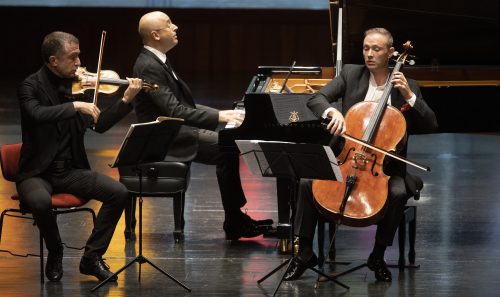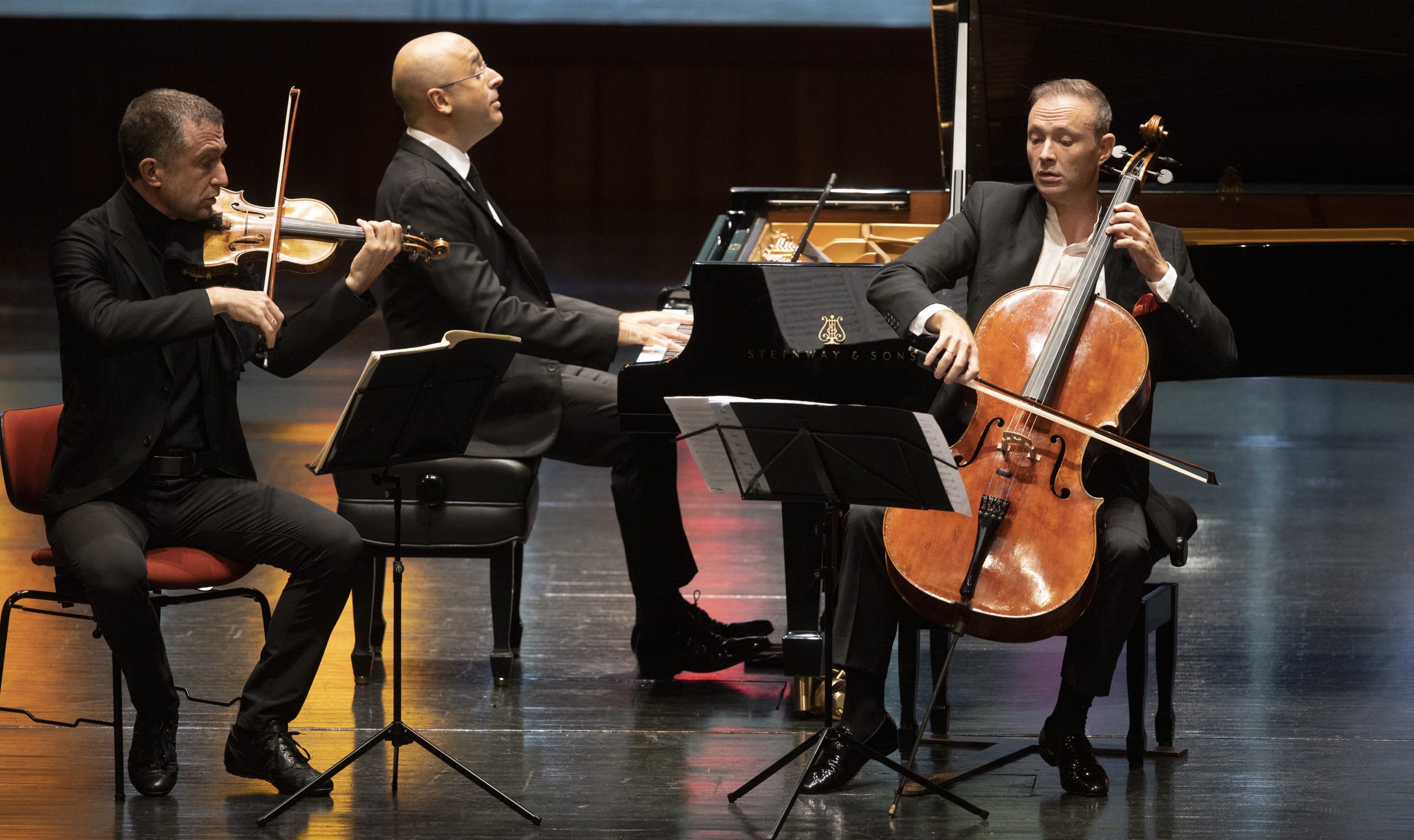 Portugal Beethoven, Dvořák, Festival Jovens Músicos 2020: DSCH – Shostakovich Ensemble (Filipe Pinto-Ribeiro [piano], Tedi Papavrami [violin], Kyril Zlotnikov [cello]). Live streamed from the Grande Auditório, Fundação Calouste Gulbenkian, Lisbon, by Radio Televisão Portuguesa RTP, 24.9.2020. (LV)
Portugal Beethoven, Dvořák, Festival Jovens Músicos 2020: DSCH – Shostakovich Ensemble (Filipe Pinto-Ribeiro [piano], Tedi Papavrami [violin], Kyril Zlotnikov [cello]). Live streamed from the Grande Auditório, Fundação Calouste Gulbenkian, Lisbon, by Radio Televisão Portuguesa RTP, 24.9.2020. (LV)

Beethoven – Piano Trio in D major, Op.70 No.2, ‘Ghost’
Dvořák – Piano Trio in E minor, Op.90 B.166 ‘Dumky’
Against the backdrop of the 10th edition of Festival Jovens Músicos, ‘transmitting a message of resilience with the notion that musical life can begin to recover its important space in the country’s cultural life’ (Festival director Luís Tinoco), three superb musicians played music by Beethoven and Dvořák with nicknames.
The Albanian virtuoso Tedi Papavrami, the cellist of the Jerusalem Quartet Kyril Zlotnikov and the Portuguese virtuoso Filipe Pinto-Ribeiro played Beethoven’s ‘Ghost’ Trio fast, passionate, and serious, seeking respites of beauty inside the torment. The balance between the violinist’s lean focus, the cellist’s fast vibrato and the pianist’s crystalline poetry was rich and multi-layered, revealing the music’s emotional heart. After the double bar, the strings singing in thirds leading up the trains of triplets were gorgeous, and their deep breathing over the piano having his way with scales was brought off with hypnotic intensity. Pinto-Ribeiro throughout applied with great care and delicacy a wide variety to the trills which are central to the music’s soundscape.
In their moderately slow Adagio Papavrami began to dominate until the ghostly dialogue erupted into its most violent angry form, draining their emotional energy. As was the composer’s inclination, he changed moods so completely for the Presto that it becomes a physical as well as musical challenge but the musicians adjusted within a few nanoseconds; momentum and pace was steady throughout, the big cello solo was comprehensive in the seamless beauty of tone and arc of its phrasing, and they made it safely home at the end.
In their moderately slow Adagio Papavrami began to dominate until the ghostly dialogue erupted into its most violent angry form, appropriately draining energy. As was the composer’s inclination, he changed moods so completely for the Presto that it becomes a physical as well as musical challenge but the musicians adjusted with a few nanoseconds; momentum and pace was steady throughout, the big cello solo was comprehensive in the seamless beauty of tone and arc of its phrasing, and they made it safely home at the end.
When the announcer mentioned the fado in relationships to the folk elements in Dvořák’s ‘Dumky’ Trio, it seemed far-fetched, and yet the trio played composer’s notions of sophisticated wild dance tunes with an unusual sadness that muted the usual hijinks; maybe Pinto-Ribeiro’s being Portuguese, or just the ambience of a city during the coronavirus pandemic, brought to their playing of the lyrical interludes a sense of saudade, of deeper loss.
Pinto-Ribeiro, Papavrami and Zlotnikov returned to Beethoven for their encore, the Adagio from Beethoven’s Clarinet Trio Op.11 – coincidentally another work with a nickname, ‘Gassenhauer’. The three lingered exquisitely as if they didn’t want the music to end, and Papavrami found a softer violinistic equivalent for the clarinet’s tootling in the perky little section towards its conclusion.
The sound was rich and strong. The few simple camera angles felt as if those cameras were themselves listening to the music.
Laurence Vittes
